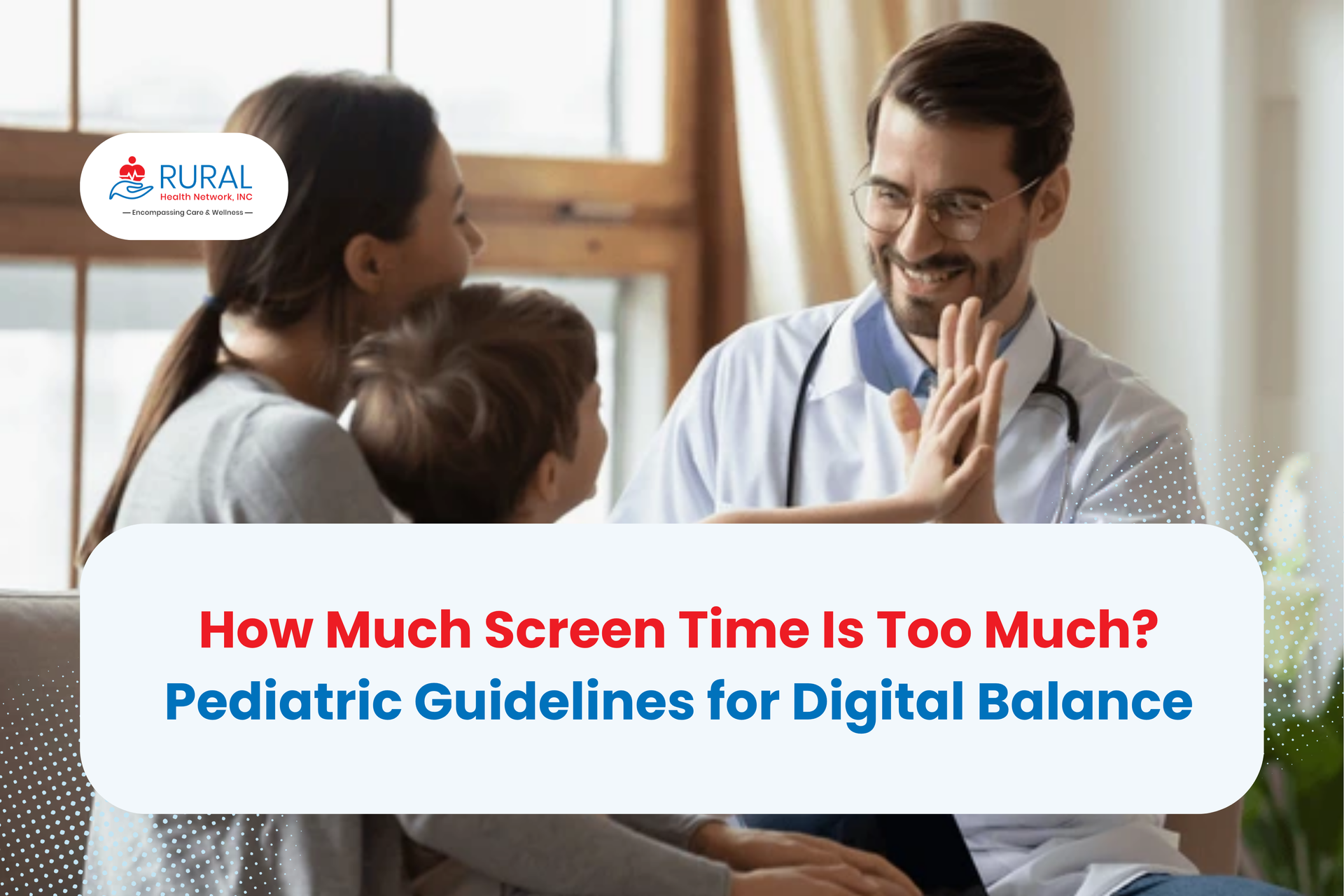We all want to see our children grow up healthy, happy, and thriving. From their first smiles to those wobbly first steps, every milestone is a moment worth celebrating.
Children develop at their own unique pace, but you may wonder whether or not they’re on the right track. In those moments of uncertainty, your pediatrician can be your trusted partner in ensuring your child ticks all the boxes in their physical, emotional, and cognitive development.
For families in rural communities, accessing
specialized pediatric help can be a challenge. At Rural Health Network, we’re here to bridge that gap. Our team is always ready to provide the support and resources you need, so no milestone is missed and every concern is heard.
Got Any Questions or Concerns?
The Difference Between Growth and Development
Many parents use “growth” and “development” interchangeably, but they represent two distinct yet equally important aspects of
pediatric care.
- Growth
– These are the physical changes you can measure, such as your child’s height, weight, and head circumference. Pediatricians track these numbers on growth charts to make sure your child is growing steadily and proportionately.
- Development
– This is how your child learns, behaves, and interacts with the world. It includes social skills, emotional well-being, language abilities, and motor skills (like crawling, babbling, or holding a pencil).
Both are equally important because they give you the full picture of your child’s health. A child might be growing perfectly in height and weight, but may need support with speech development, or vice versa.
Remember, this isn’t about comparing your child to others. Every child has their own pace. What matters is steady progress and catching concerns early in your child’s development, so you can give them the support they need.
Developmental Milestones by Age
Let’s look at the
common milestones you can expect to see
as your child grows. Take note: These are general guidelines, not strict deadlines.
One child may start talking earlier, while another may be quick to run and climb. Both are normal!
If you notice anything out of the ordinary or something significantly concerning, getting regular pediatric check-ups can give you answers and an expert action plan. If you see signs of developmental delays—such as not babbling by 12 months, difficulty walking by 18 months, or limited eye contact—your pediatrician can spot these early and recommend the best steps to take or provide referrals to specialists.
Your Pediatrician’s Role in Tracking Growth and Development
While parents know their children best, it can be hard to tell whether their behavior is a phase or a sign of something more. When you have a pediatrician, they bring medical expertise, objective tools, and a trained eye to let you know exactly what’s going on regarding your child’s growth and development.
How does your pediatrician track your child’s progress? They usually focus on three primary areas.
Well-Child Visits
- Examine height, weight, and head circumference.
- Track growth and health progress with growth charts and BMI.
- Provide advice and guidance on everyday concerns like nutrition, sleep, and behavior.
Developmental Screenings
Early Detection and Support
- Spot potential issues early to prevent escalation.
- Connect families with specialists or therapy options as needed.
- Develop a personalized plan with your input to support your child’s unique needs.
What Can Parents Do Between Visits?
Your pediatrician may guide you during check–ups, but you play the most important role in your child’s day-to-day life. Fortunately enough, keeping track of your child’s growth and supporting their development isn’t all that complicated. Here are a few ways you can help:
- Keep a Milestone Journal
Write down when your child achieves a new skill like rolling over, saying new words, or drawing their first picture. This helps your pediatrician see progress over time and immediately address any problems they may notice.
- Pay Attention to Playtime
Playtime is learning in action. Observe how your child uses toys, solves puzzles, or joins group play. These moments reveal a lot about problem-solving, coordination, and physical development.
- Encourage Communication
Talk, read, and sing to your child regularly. Celebrate every attempt at a new sound or word. The more you engage, the more confident they’ll become in expressing themselves.
- Observe Daily Routines
Everyday activities like mealtime, bedtime, and getting dressed can show you how your child is developing motor skills, independence, and emotional regulation. Look for steady progress, no matter how small.
- Speak Up About Concerns
Trust your instincts. If something feels off, call your pediatrician. No concern is too small, and early conversations can make a big difference.
Common Red Flags Parents Shouldn’t Ignore
No two children develop at exactly the same rate, and a little variation is completely normal. Still, certain developmental problems may indicate that your child needs extra support. Keep an eye on these:
If you notice any of these signs, discussing them with your pediatrician is the best step you can take.
Support Your Children’s Health and Development with Rural Health Network
Raising children comes with a mix of joy and worry, and sometimes families in rural areas don't always have easy access to the care and support they need. When it comes to our little ones, we want to make sure they have nothing but the best.
When you need the right experts in your corner, you can count on
Rural Health Network
to guide you through each stage of your child’s development with our:
Child-Centered Expertise
Our pediatric specialists will focus on your child’s unique health needs in an environment designed to make them feel comfortable, safe, and cared for.
Well-Baby and Child Checkups
We offer routine checkups to track growth, spot concerns early, and celebrate milestones in every aspect of their emotional and developmental progress.
Guidance for Parents
Parents are the most important part of a child’s care team. That’s why we share knowledge, answer questions, and provide ongoing support so you feel confident in every decision you make for your child.
Every milestone is worth celebrating, and every question deserves an answer. Together, we can give our children the best start in life because when our kids thrive, our whole community will, too.
Build Your Child’s Foundation for Success
Frequently Asked Questions
How often should my child see a general pediatrician for checkups?
Most children should have well-child visits several times in the first two years, then once a year after age 2. These visits are key for tracking growth and development.
What if my child seems behind in one area but advanced in another?
This is common. Children rarely develop evenly across all aspects. A pediatrician can help determine if the differences are normal or if extra support might be helpful.
Can telehealth be used for developmental concerns?
Yes, many developmental questions can be discussed through telehealth. While some assessments require in-person visits, telehealth can be a great first step for parents in rural areas.
How can I prepare for a well-child visit?
Bring a list of milestones you’ve noticed, any concerns you have, and questions you need answers for. This ensures your pediatrician has a full picture and nothing gets overlooked.













